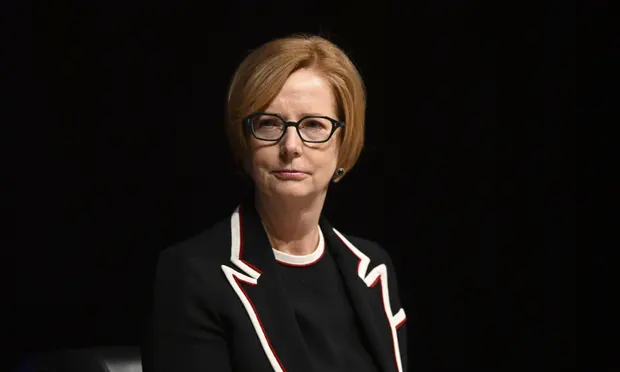Julia Gillard says Australia will ultimately become a republic but has endorsed the prime minister, Anthony Albanese’s view it is too soon for the debate.
The former Australian prime minister told the ABC, in her first interview since the Queen’s death, that Albanese was right to delay consideration of a republic to a future term of government.
Before flying to London on Thursday Albanese said the Queen’s death had made Australians “more conscious of our system of government”, but he has refused to be drawn on timing of a referendum beyond noting his government’s first priority is to recognise First Nations people in the constitution.
Gillard said at its centre the Queen’s passing is a human story of loss and grief. “A family has lost a beloved member and because the family is so on the public stage we’re sharing that moment,” she said
Gillard said that everybody’s experience of the monarchy was different but for many Australians the Queen represented continuity “in a chaotic and fractured world”.
Asked if she was still of the view the Queen’s death would be an appropriate time to move away from a British head of state, Gillard said: “Yes, I always thought that when the Queen did leave us, that it would cause a period of reflection.”
“I always thought in Australia too it would unleash a new set of reflections about our own constitutional arrangements.
“But there’s no rush and I certainly endorse what the prime minister has said. There’s time for measured discussion. It’s certainly too soon for that now.”
Gillard said that Albanese would honour the Queen at the funeral on Monday.
“And then I think we can have a measured, steady discussion, which will ultimately take us, I think, in the direction of a republic,” she said. “But it won’t be quick.
“He’s said it’s something he wouldn’t contemplate until a future parliamentary term. I think that’s right.”
On Thursday Albanese told ABC Brisbane some people have “expressed surprise to me about how King Charles has ascended to the throne automatically”.
“And it is a chance, I think, for us to reflect on the system that we have over a period of time,” he said.
Asked about his republican views, Albanese told ITV his job as prime minister “is to represent Australia at this historic time”.
Australians hold a “range of views over our constitutional system, but [are] united in respect for the life and service that her majesty Queen Elizabeth showed to Australia, to the Commonwealth and, indeed, to the world”, he said in a pre-recorded interview before his departure.
Albanese said the Queen had recognised the royal family “would respect the decisions which Australians made” about becoming republic, but said it was a debate “for another time”.
“In terms of constitutional changes, that is very difficult to achieve in Australia,” he said, adding that his “priority for constitutional change is recognising [Indigenous Australians] in our nation’s birth certificate”.
Asked about the governor general’s role appointing Scott Morrison to multiple secret ministries, Albanese said David Hurley had taken advice from the elected government and it was Morrison who “needs to explain the circumstances in which that occurred”.
“It’s also the case that the governor general may have made inquiries of the prime minister of the day, those discussions, private discussions and we don’t know, at this point in time, what those discussions entailed,” he said.
Earlier, Gillard said that “some things have got better” for women in politics in the last decade, saying “we are much more likely to talk about gender, sexism, misogyny, in politics now.”
Gillard said former US president Donald Trump had been criticised for “sexism 101” for describing Kamala Harris as a “nasty woman”.
“I think that is the kind of thing that would happen if there was a woman prime minister in Australia today,” she said. “There would be activism around making sure her treatment was fair.”
Source: The Guardian



